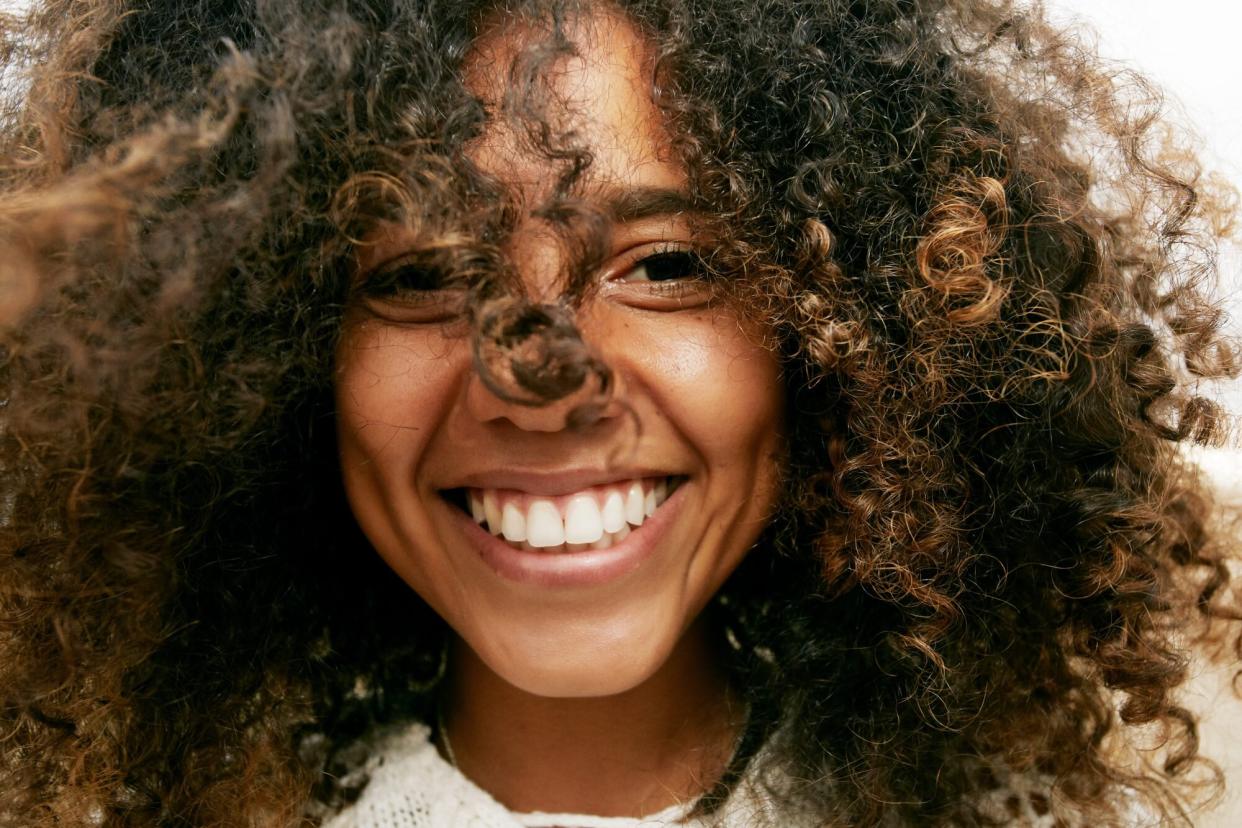Celebrity Stylists Want You to Follow These 5 Natural Haircare Tips for Winter

Getty Images
Winter is the time to be cozying up to the fire, bundling up in your favorite coat, and sipping hot cocoa — and it's also the time when dry air can really wreak havoc on your hair.
Whether you're outside in the cold or inside with the heat blasting, you really can't win this time of year. And while this applies to every type of hair, naturals suffer the worst.
That's why we hit up hairstylist Dyana Nematalla, who owns two Atlanta hair salons and specializes in curly hair, as well as the founder of eponymous haircare line and celeb go-to Kim Kimble — who is known for working with clients such as Zendaya, Kerry Washington, Gabrielle Union and Tyra Banks — to get their tips for making sure your natural hair stays healthy, bouncy, and free-of-damage, even as the temps drop.
RELATED: How to Prep Natural Hair for Cold Weather Heat Styling, According to Top Hairstylists
Use Moisturizing Products
"Your hair tends to get dry when the weather gets cold and you have the heat on at the house all the time," explains Nematalla. "When your hair gets dry and there's no humidity, that's when you get flyaways. To combat all that, you need to put more moisture back into your hair during the winter." To do so, Nematalla suggests using a rich moisture masque once a week. We're fans of Miss Jessie's Super Sweetback Treatment.
Stylist Kim Kimble agrees. "I like to put a hair masque in and then use a steamer, because it helps melt the product down," she says. "Masques are thicker and heavier, so the steamer helps to break down that product and get it into the cuticle of the hair."
But if you don't have a steamer you can use, try this old school trick: Apply the masque to the hair, get a towel wet and then stick it in the microwave until it gets very warm. Wrap your masque-soaked hair in the towel and then cover that with a shower cap or plastic bag. Then let it soak for at least 30 minutes.
Nematalla is also a fan of oils and has a personal routine she uses on her own curls that she recommends to others: "I heat up the oil in the microwave or place the bottle in a bowl of hot water to melt it down, and then I pour it into a bowl and take a color brush and brush it on my hair, starting at the ends and working my way up. [When you're done] just clip your hair up and you can leave it on overnight or while you work out or even do housework."
She does warn, however, that you don't want to concentrate too much of the oil on your scalp, but really focus on the ends, which is the oldest and therefore driest part of your hair.
Protect Against Heat
"In the wintertime, women usually do more blowouts and more styles that require heat, which dries your hair out, so it's super important to use heat protectors," says Kimble. "I have a heat protectant in my line of products, because it's such a crucial step."
Nematalla also suggests lowering the temperature on your hairdryer in the winter, too. "Once it gets cool outside, you need to immediately switch the blowdryer to medium heat to reduce the damage," she says.
VIDEO: Venus Williams Brought Back Her Signature Beaded Braids
Sleep on Silk
"All year round, but especially in the winter, you need to sleep on a silk pillowcase, put your hair up in a silk bonnet or use silk rollers," says Kimble. "Cotton sucks all the moisture out of your hair, but silk keeps it from getting dry and breaking off."
But what about the satin or faux silk pillowcases that are becoming more prevalent? Do they work as well for protecting breakage and damage for your hair? "I'm not here for the knock-off," Kimble shares. "I've used the other stuff, but there's something about the silk that really makes your hair feel silky and look shiny and keeps it conditioned."
Focus on Your Scalp
We all know now that healthy hair starts with a healthy scalp, and the cold weather makes it easy for scalps to get itchy and flaky.
"When the weather changes, the pH of your scalp changes, so I love to use a scalp serum like the Virtue Topical Scalp Supplement," says Nematalla. "After you apply the serum, then you can use a scalp scrubber and it helps soothe, rebalances, and nourishes your scalp and hair."
Drink Up
Yes, even your hair wants you to drink more water! Being dehydrated directly affects the moisture level of your strands, so you really can improve the health of your hair by staying hydrated. "It sounds like a wellness tip, but it really is a beauty tip," says Kimble. "You'll be surprised what a difference you'll see in your hair if you simply drink enough water."
This is All Natural. From the kinkiest coils to loose waves, we're celebrating natural hair in its many forms by sharing expert tips for styling, maintenance, and haircare.


